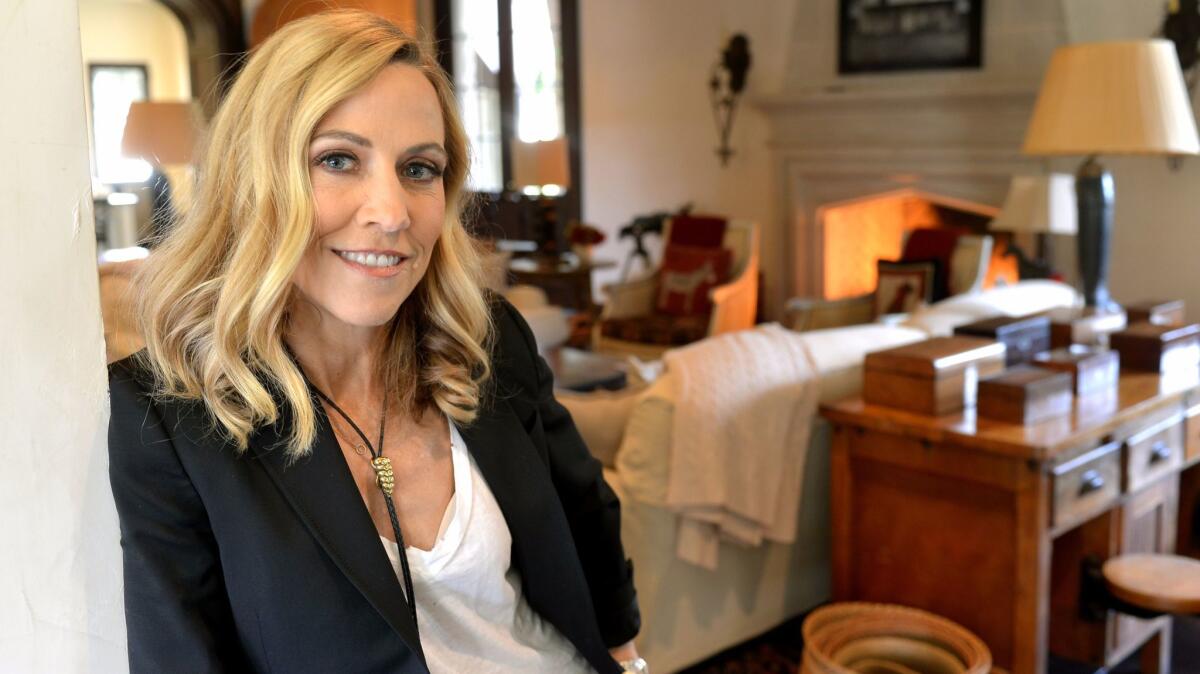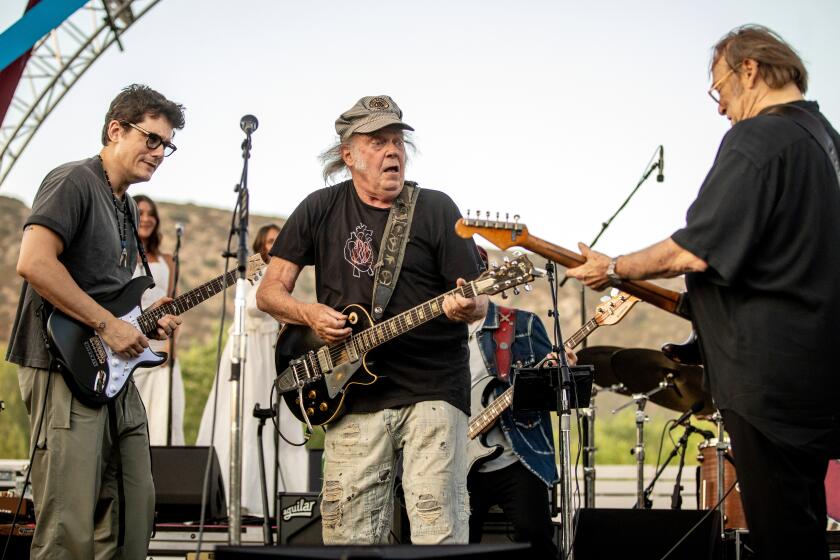Sheryl Crow talks music, compassion and being the ‘dorky mom’ performing in a worn Mickey Mouse T-shirt

Reporting from Nashville — Sheryl Crow pulled up a stool and sat down at the counter in the spacious kitchen of her farmhouse about 10 miles out of downtown Nashville.
It’s casual Thursday on the Crow family spread that she shares with her two sons, who are in school this morning while she greets a visitor. She’s sporting a fading Bruce Springsteen T-shirt, well-broken-in jeans and black boots, an ensemble that’s more about function than fashion, comfort not couture.
Just five nights earlier, she was on stage at the Troubadour in West Hollywood, where she gave a boisterous crowd of about 500 fans their first sampling of material from her latest album, “Be Myself,” out April 21 through her new record deal with Warner Bros. Records.
See the most-read stories in Entertainment this hour »
Her sons, however — Wyatt, 9, and Levi, 6 — had some advice for Crow the performer.
“The kids were like, ‘You’re not going to wear that, are you?’” she said, an unforced laugh accompanying the memory of her decision to sport a a lived-in Mickey Mouse T-shirt. “I said, ‘Yeah, it’s comfortable.’ They’re like, ‘You sleep in that, mom — you can’t wear that on stage!’”
It’s one measure of her evolution from fashion plate of the 1990s, a woman who inspired legions of fans and would-be singer-songwriters to follow the trail she blazed with her breakthrough album “Tuesday Night Music Club,” to her position today as a beacon of reliability in an ever-changing world.

It’s quickly apparent that her top priority these days is being a single mother to the children she adopted in 2007 and 2010, respectively, and she doesn’t hesitate — in conversation or in song — to voice her hopes and dreams as well as hear concerns about the world in which she’s raising them.
Such thoughts and emotions come up often on “Be Myself,” on which she collaborated again with her longtime songwriting partner Jeff Trott, whom she lightheartedly calls “my musical husband.”
“We have to try so hard to be liked: to get ‘Likes’, not to get disliked, not to lose followers, to try to be cool like everybody else is cool,” she said about one of the themes she has tackled in song. “I think a lot about the pressure of that. I feel so grateful to be my age and not have to think about that. I can be the dorky mom my kids think I am and take pride in that.”
The new album is a return to the core Sheryl Crow sound following a rootsy detour into more rural territory on her 2013 effort “Feels Like Home,” which she co-produced with veteran Nashville producer Justin Niebank.
In true Music City style, she teamed up with a number of Nashville’s most successful songwriters on the material, among them Brad Paisley, Chris Stapleton, Brandy Clark, Shane McAnally, Chris DuBois, Luke Laird, Al Anderson and Natalie Hemby.
Ultimately, it wasn’t an entirely rewarding experience for her.
“That record was fully enjoyable to make,” she said. “I felt I really stretched myself as a songwriter. I forced myself to sit in a room with writers from Nashville and that was good for me. I felt there was good songwriting on the record. I had no expectation for the record [in terms of sales], but what I didn’t expect is that [country radio programmers] really don’t play women unless it’s Carrie [Underwood] and Miranda [Lambert].
“The other thing I didn’t expect is how much you have to make yourself available to record promoters and radio programmers,” she said. “That was something I never had to do before. The amount of nights I spent away from my kids I can’t get back, and I made a promise at the end of it that I’d never do that again.”
So, this time around, she hunkered down in the cozy home studio that sits above the kitchen and front room of her house. Strolling up the stairs to the studio, she can pop open the top half of a Dutch door, allowing one of her horses to meander over and poke his or her head in for a quick stroke on the nose or an equine treat.
“Jeff moved [to Nashville] last June,” she said, “because he wanted to do more songwriting, and he felt this was a good place to raise his kids. He and I got together and we just started playing around in the studio, like we do — him on guitar, me on bass and this really creative programmer. We wound up writing three songs pretty quickly, and we looked at each other and said, ‘Man, we have a record in us.’
“We got together a couple more times, and by the time we’d done that four or five times, we had 17 songs,” said Crow, whose spring-summer tour will stop in San Diego on June 6 and the Greek Theatre in Los Angeles two nights later. “There was so much to write about, gosh, from technology to fear of what was going on in politics to what’s going on in people’s minds and the chasm between people. It was like barfing out lyrics,” she said with another hearty laugh.
In “Halfway There,” she broaches the subject of bridging what can seem like an ever-widening gulf among people with different interests and priorities: “You pull up in your Hummer and you park next to my Volt. Wearing an Armani 3-piece, I wear Levi’s full of holes/Well I walk on the left side, and you walk along the right/We’re both trying to reach the same place, we might not get there on time.”
She addresses the challenge of trying to forge human relationships in the age of social media and 24/7 connectivity with the world in “Rollerskate”: “I want some attention/I wanna put you center stage/I don’t want competition, So put your phone away, let’s rollerskate.”
“It’s sort of insurmountable to me that how we navigate through relationships nowadays with this gadget that exists between us,” she said. “It’s supposed to be a means of communicating, yet it robs us of our ability to experience empathy.”
And she and Trott cooked up a tale of international political intrigue in “A Heartbeat Away”: “You bet the president is sweating/ While Russia’s blowing up the phone/Deny, deny everything but still let’s/Throw that rabid dog a bone.”
As up to-the-minute as the latter sounds, it was written last year, and the album was finished before the November election of Donald Trump.
“When we wrote about that there wasn’t any presence of Russia” in the news, she said. “But when you write an espionage song, you think about ‘Who are the bad guys?’ Who are the obvious bad guys? You’re like, this will never happen. And then you end up doing a song talking about Russia. I love the way that art works.”
For the most part, she said, she and Trott tapped into the work pattern that yielded them such hits for her as “If It Makes You Happy,” “Everyday Is a Winding Road” and “Soak Up the Sun.” Not surprisingly, that has produced an album that sounds like classic Sheryl Crow, full of funky, pulsing rhythms emanating from her lithe bass guitar lines and hook-filled choruses that quickly work their way into listeners’ ears.
She has yet another album on track possibly for release next year, one in which she recorded with several of her musical heroes she has befriended over the years. It grew out of a session she did a few years ago with Kris Kristofferson, who has struggled in recent years with failing memory, a condition initially diagnosed as Alzheimer’s but last year re-diagnosed as a result of Lyme disease.
“When I left, I felt extremely melancholy about life,” she said. “That was on the tail end of promoting the country record. I started feeling like, ‘Oh man, I am so blessed to have known my heroes.’ But I was feeling like I’ve spent no time capturing my relationships artistically. I’ve showed up for everything — I’ve recorded with a lot of people, I’ve produced people, but I’ve not asked people to come in and record with me. So I started asking.”
The outcome was an album of duets that is expected to feature Crow with Willie Nelson, Stevie Nicks, Don Henley, Neil Young and others. “Everyone has been exceedingly accommodating, but also really loving about it.”
She’s trying to carry that attitude forward, even though today’s tense political polarization has made it increasingly hard for her to feel a real dialogue with those who don’t share her progressive philosophy.
“I had a great conversation after Trump was elected with this meditation teacher,” she said. “One of the things she said to me that resonated for all things is, ‘Love what is lovable and have compassion for what isn’t’.”
That brought her back to the topic of music not just as a form of entertainment or even individual expression, but as an agent of transformation, something she’s leaned on in dealing with the non-invasive form of breast cancer with which she was diagnosed in 2007, and the brain tumor she was discovered to have in 2011.
“Having been a cancer survivor,” she said, “I’ve had so many conversations with people about the metaphysical, about the actual physical, cellular [aspects of the human body], about how our cells have a round shaped when we are at peace, or in peace, and how our cells do not look or even work the same way when you are stressed.
“I think it’s true of music — and laughter,” she said. “It changes your molecular structure, your cellular being.”
Follow @RandyLewis2 on Twitter.com
For Classic Rock coverage, join us on Facebook
UPDATES:
9:05 p.m.: This article was updated with dates of Crow’s Southern California tour stops.
More to Read
The biggest entertainment stories
Get our big stories about Hollywood, film, television, music, arts, culture and more right in your inbox as soon as they publish.
You may occasionally receive promotional content from the Los Angeles Times.










